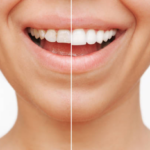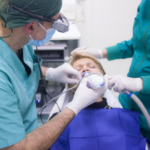A lot of people think that skipping a tooth brushing now and then won’t hurt them. This might not be true.
If you forget to push your teeth a few times a week, you shouldn’t have any major dental problems. It’s best not to make it a habit. You should brush and floss your teeth at least twice a day to keep your mouth clean and your teeth healthy.
A toothache or cavity aren’t the only health problems that can be caused by poor dental health – so it’s best to keep your mouth healthy for your overall fitness.
Dental Health Problems
Plaque doesn’t build up on your teeth if you take good care of them. Plaque can cause a lot of dental problems, but at first, it’s almost impossible to see because it isn’t visible to the untrained eye.
Cavities
People who have plaque on their teeth are at risk of getting cavities because bacteria survive there. Those very same bacteria can get through your tooth’s protective enamel and get inside your body.
There are a lot of bad things that can happen to your teeth if you don’t get rid of a cavity. In the worst case, your teeth could fall out! News that’s good: Brushing and flossing your teeth often can help keep your teeth healthy.
Gingivitis
Plaque can hurt the gums and lead to gingivitis, which is a type of gum disease that can lead to tooth loss. Plaque is made up of microorganisms that irritate and inflame gums. Will be red, sensitive, and bleed more often. If you have gingivitis, your gums may recede, which can cause further damage.
Periodontitis
In the same way that plaque leads to cavities, gingivitis leads to periodontitis. This is an infection that affects the bones that support your teeth. People who have periodontitis are more likely to lose their teeth.
How Long Does Plaque Take to Build?
Dental health has a genetic component. It’s easy to become upset when you see someone who doesn’t brush get away with no cavities. You brush your teeth twice a day, but your enamel is weaker than someone who does not.
Although genetics plays a role in the health of your teeth, everyone should brush. Brushing and flossing are undeniably effective in preventing plaque buildup, which in turn prevents other dental issues.
Here is what would happen if you avoid good proper hygiene at different lengths:
One day without brushing:
Plaque can be removed by brushing our teeth properly, but the longer it stays on our teeth, the more difficult it is to remove. Plaque that has been on your teeth for 48 hours begins to eat away at your dentin. Tartar forms when plaque hardens, and it must be scraped off by a professional.
One week without brushing:
After a week, the enamel on your teeth will start to fail. The plaque that hasn’t been removed will increase the development of bad breath. Cleaning a plaque-ridden tooth is difficult.
If you don’t brush your teeth for a week, you’re more likely to develop cavities. There’s also a chance that the plaque will begin to irritate your gums, causing them to hurt even more.
Continued poor brushing habits:
If you don’t brush your teeth or brush haphazardly for a year, you’re likely to have a lot of dental problems. All of these things will happen to you.
It can also cause other health problems in your body, like an infection or high blood pressure, if you don’t clean your teeth properly.
Proper Oral Hygiene
It’s not always easy to agree on what constitutes good dental care. ADA’s recommendations are a good thing to follow, so that’s what you should do. The American Dental Association has some tips for how to properly care for your teeth every day:
Brush
Brush your teeth twice a day with a toothpaste that has fluoride in it to keep them from getting cavities. Brush your teeth for at least two minutes to make sure you get rid of as much plaque as possible.
Make sure you don’t put too much pressure on your gums, because this can hurt them.
Floss
Every day, you should floss. If you don’t like flossing, think about water flossing as an alternative. If you want to keep your teeth healthy, you might have to make flossing a habit.
Visit Your Dentist
Call your dentist and set up a time to meet. You should visit your dentist at least once every six months.
Some dentists might tell you to go to them more often. In people who have had cavities before, have gum disease, or are at risk of getting gum disease, this is especially important to remember
Use Proper Equipment
Switching from a manual to an electric toothbrush can make a big difference in your dental health. Electric toothbrushes help people brush for the right length of time with their timer settings and are better at removing plaque.
If you don’t want to spend money on an electric toothbrush, make sure you use a soft bristle brush and brush your teeth in a circle.
Have a Healthy Diet
Dental decay can be prevented by eating a lot of fresh fruits and vegetables and cutting back on foods that are high in sugar, like soda.
Dental Cleanings & Checkups
If you forget to brush your teeth from time to time, don’t worry. You’ll be fine.
But don’t forget that brushing your teeth at least twice a day, flossing once a day, and going to the dentist at least twice a year can help keep your teeth healthy.
Your teeth will be healthy if you have dental checkups every few months. It’s easier to treat cavities and gum disease if they’re found early on. You may not even need to fill some of your teeth with fillings if you find them early enough!
Dental cleanings will help get rid of hard-to-reach plaque and tartar. Professional teeth whitening is always a good choice if you want to make cosmetic changes.










